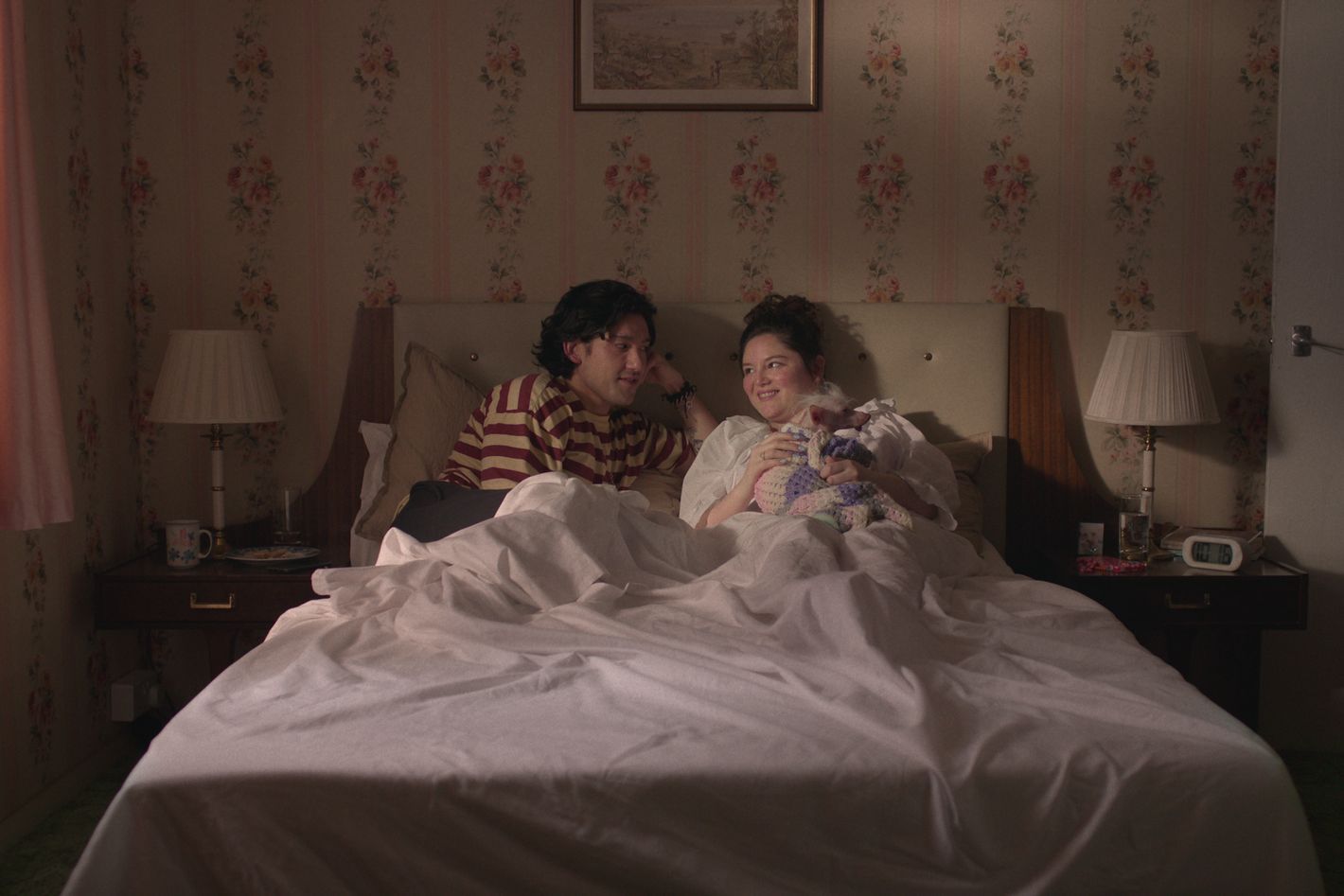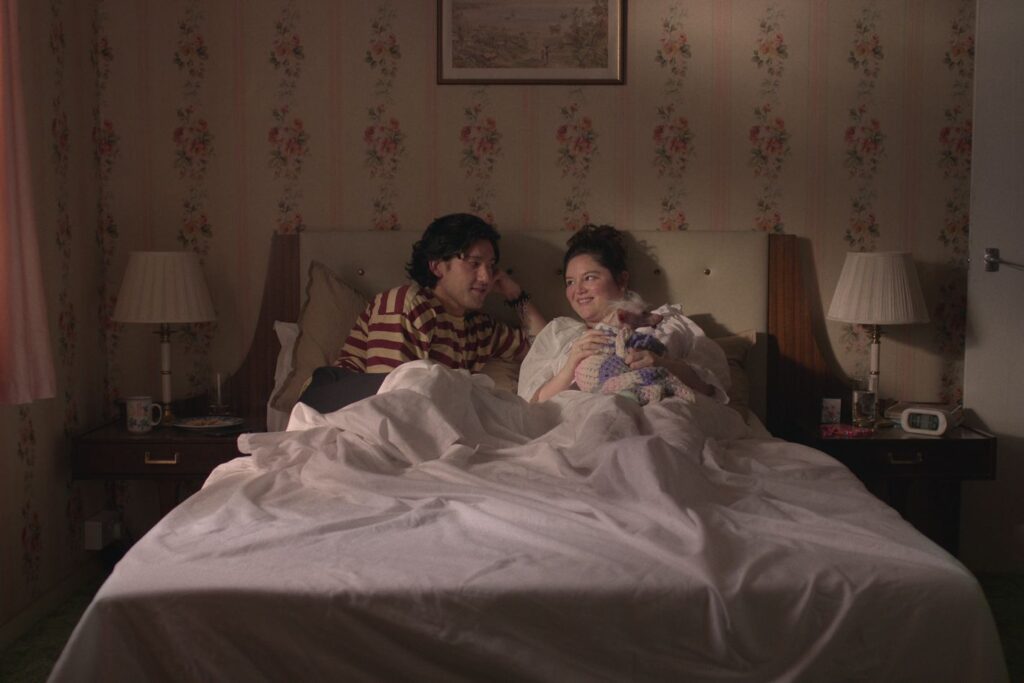
Every episode of Too Much is titled, cheekily, after a romance movie, whether comedies or not; episode three is a riff on Richard Linklater’s Before Sunrise, the first installment of a trilogy that chronicles the story of Jesse and Celine, whose lives change when they meet on a train. In those movies, as I’m sure readers will remember, all Jesse and Celine do is talk. Before Sunrise’s plot is simple, even thin: when the train stops in Vienna, Jesse asks Celine to get off with him and spend the night wandering around the city before he has to catch a flight back to the United States in the morning.
The genius of Before Sunrise is that it devotes ninety minutes to a process which, in most rom-coms, is compressed into a minute-long montage. Picture it: after the meet-cute, there’s the couple in bed after sex, walking around the market, eating in the kitchen. It’s Tom and Summer shopping for records, Annie and Alvy making lobster, Rachel Samstat and Mark eating out of a giant bowl of spaghetti carbonara in bed. In a movie that follows the standard dictates of a romantic comedy (couple meets, falls in love, breaks up, gets back together), the montage is used to speed up the get-to-know-you stage, allowing us to move on to the drama of the break-up and have our heartstrings tugged.
“Ignore Sunrise” doesn’t totally pass Vulture’s bottle-episode test — there are some extra set-ups and scenes that surely added some rows to the shoot’s budget spreadsheet — but it does give us 30 minutes of more-or-less uninterrupted chemistry between Felix and Jess. With every passing episode, I’m more taken with Will Sharpe’s performance: he disappears in his character in a way that Stalter has trouble matching. It’s true that Jess is self-aware, where Felix is more self-assured, and Sharpe is a generous scene partner, giving Stalter plenty of room to shine. However, there is a conscientiousness to her performance that thrives in some situations — as, for example, when Jessica is filming the kind of front-facing-camera video that Stalter herself became famous for during the pandemic — and hinders others, as when Felix and Jess are starting their talking marathon night in the kitchen. Sharpe’s charm is so disarming, though, that as time goes on, Stalter relaxes into her position; by the time it was past 1 a.m., I was fully engaged in their developing romance.
The bottle-episode guide explains that, because of the strictures of the form, the episodes tend to “create some reason for everyone to get stuck inside this small place: a door is locked, there’s a deadline, there’s a bomb threat, there’s something to wait for.” In this case, Jess has to make an 8:30 a.m. meeting after getting a “bollocking,” as Felix puts it, from Jonno (Richard E. Grant). He catches her googling Felix Remen and watching old music videos from his several different bands and tells her that he brought her on because she has a reputation for “getting the job done,” though she has yet to prove her stripes. The fictional famous director who will direct the Christmas commercial is starting set-up in a couple of weeks, and Jonno needs Jessica to get her head in the game. So, he gives her — through Josie, who looks embarrassed to be delegated the task, if in agreement with some of his assessments — a list of ten behaviors to avoid, “some cultural and some personal.”
While Jess is at work, Felix rehearses with his band and briefly stops by at a job agency, where he both looks for a job and explains his reasons for not having one. He’s caught in that dilemma familiar to those of us who have ventured into a career in the arts: his music doesn’t make him any money yet, but for him to be able to one day make money from his music, he has to write said music, which he wouldn’t be able to do as well if he spent all his time looking for or at a different job. Later, hanging out in Jess’s kitchen as she finishes her work, we get a glimpse of their world-view contrast, some of it cultural and some personal. Jess has accepted that adult life is all about having to do things you don’t want to do (being a producer instead of a director and staying up late to fix lighting budgets) while Felix is convinced that adult life is all about finding a way to do only what you actually want to do (make music, in his case).
In narration, Jess wonders to Wendy whether she is able to stay present in the moment or whether she is, like her, always thinking of something else. Jess tells Felix that they can’t stay up late because of her morning meeting; but they never go to sleep, and the rhythm of their night is set according to the moving clock: we check in at 10, then 11, then 1 a.m., 2:30, 4, and finally past 5 a.m. The alarm clock rings at 6:45. At each of these time stamps, Jess and Felix have sex, talking and hanging out in between. At first, Jess has a hard time being present: just before midnight, Felix puts on Paddington, a movie he loves dearly. He cries through the whole thing, but Jess can’t concentrate on poor Paddington: she watches Wendy’s Instagram stories instead.
Eventually, Felix takes the phone from Jess’s hand, jokingly disappointed that she was on her phone through the whole movie instead of crying along. In the bathroom past 1 a.m., she checks in on Wendy’s feed once more, where she sees a video of Wendy asking Zev whether he’d still love her if she were a worm. It reminds her of when she asked him the question herself and he dismissed her. The memory prompts a fantasy of being friends with Wendy, having a sleepover, making out…
Jess is pulled back to reality by the sight of Felix having a cigarette on the fire escape, and they have sex again before putting a show on the computer. This is when the talking begins in earnest. They go over a variety of topics, from the kind of thing that can really relax Jess — Dateline more than Paddington, because she needs to know that there’s someone out there worse off than her — to how Jess is a little like Paddington herself. Here, Nice Guy Syndrome shook me from my stupor. Felix tells Jess that there’s something about her that makes him want to take care of her. He doesn’t heat up everyone’s noodles and he doesn’t offer to tell everyone when morning comes, so they can sleep soundly with the curtains closed. But there’s a suspicious, cynical part of me that’s like, yes, you do, Felix. That’s your whole M.O.! Telling someone that there’s “something about them” that screams “helpless” is just a gloved way of calling them “messy,” an insult which sent Jess off on a self-righteous monologue in the previous episode.
Granted, Jess is helpless, and in classic Lena Dunham fashion, there’s more than a bit in this episode to show off her flaws. Her hyper-fixation on Wendy is just another manifestation of her self-obsession, and whereas her open, earnest manner gestures at vulnerability, it’s mostly just performance. “Ignore Sunrise” really takes off when both Jess and Felix’s performances break down, and they share windows into their pasts with each other. Felix kicks it off: when Jess asks him whether he’s ever been “gold-pantsed,” a term for getting the ick that she and her friends used in college, he tells her about a time when he became frightened of the vacant look in a hook-up’s eyes. The conversation leads them to talk about his sobriety and what it took for him to change, and we learn that Felix has been off drugs and booze for three years.
Jessica’s overbearing mom calls her, which leads Felix to ask her about her parents. Jess tells him about her late father (Kit Harington), who had a violent form of Parkinson’s disease that rendered him basically immobile later in life, but she remembers her childhood with him with touching tenderness. In a sequence of flashbacks that play against her narration, she recounts his craftsmanship and delicacy, the way he saved her from shitty sleepovers and was, in that dad way, a hero to her. It’s the kind of sequence that, for those of us lucky enough to have fathers and love and be loved by them, makes you want to call your dad. This, I think, is what a romantic comedy is all about: at best, it’s a reminder of all the love you have in your life; at the very least, it gives you hope that you will one day find it.
This, too, is what the romantic comedy is all about: it makes you sappy! I’m not sorry and neither is Lena Dunham, thank God. By the time it’s past 5 a.m., Jess is almost ready to revert back to her old habits. When Felix can’t orgasm because they’ve had sex about three hundred times in the space of five hours, she worries at first that it was something about her that hindered him, but the shallowness of the validation she seeks — the kind based on looks and performance — is obvious compared to really feeling seen for who you are, the process they’ve been engaged in all night.
At his request, Jess tells Felix some nice things about him, too, and when they get back in bed, she does a thing with him that Zev did with her — they kiss through a whole song, to the rhythm of it. Felix falls asleep before they make it to the end, and as the alarm is about to go off, Jess gets up. She eats her cold noodles standing up with the fridge door open, her eyes filled with an expression not unlike the one Felix described his once-ago hook-up having that gold-pants morning. Whatever ominous resonance that might have, I let out a sigh of relief to see her standing; as much as I enjoyed their Before Sunrise night, I was really worried she wasn’t going to make it to the damn meeting.
A riff on Richard Linklater’s Before Sunrise gives us 30 minutes of more-or-less uninterrupted chemistry between Felix and Jess.

































































